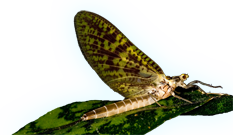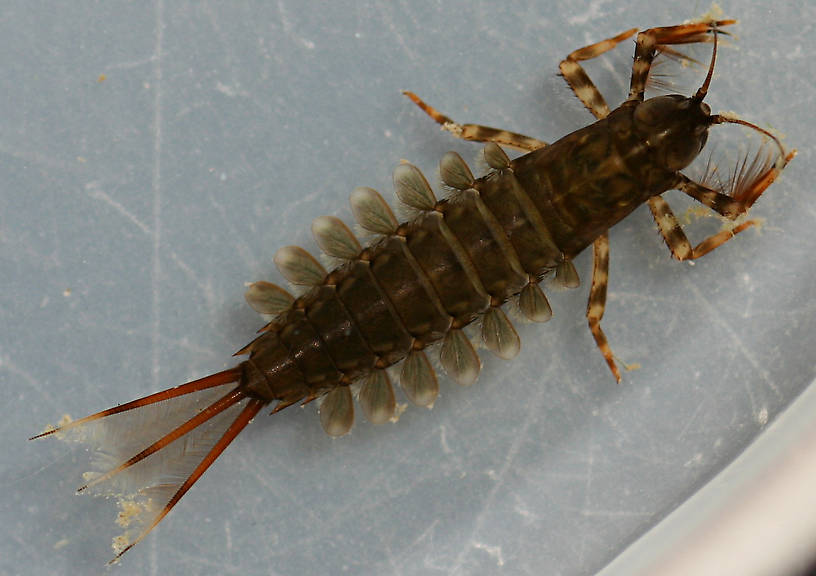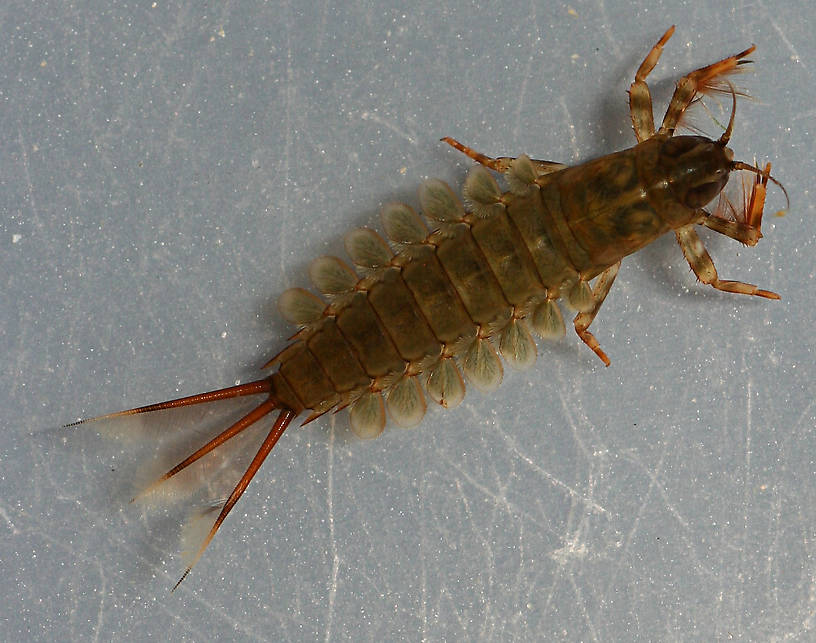Blog & Latest Updates
Fly Fishing Articles
Insects by Common Name

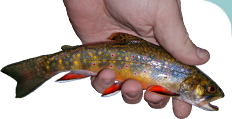
> > Isonychia velma nymphs
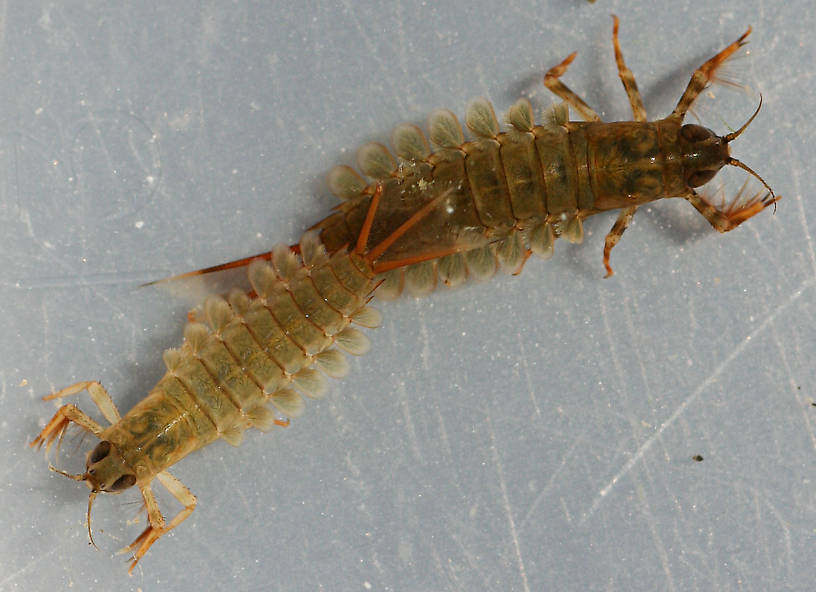
Nymph shown in photo above and earlier instar. Collected July 27, 2014. Smaller nymph 10 mm (excluding cerci).
| Millcreek | July 28th, 2014, 8:07 pm | |
| Healdsburg, CA Posts: 356 | Was down at the Russian River yesterday and the Isonychia nymphs are turning up in fairly large numbers. They're probablyIsonychia velma but since I haven't found adults yet there's always the possibility (slim) that they could be a new species. The only keys for nymphs I'm aware of are by Kondratieff and Voshell (1984) and they state that there are very few ways to differentiate among nymphs. Day (1952) reared Isonychia velma nymphs but his description of the nymphs doesn't give any real definitive characters that would separate it from other Isonychia nymphs. Traditionally Isonychia velma nymphs have been identified through association with adults or by geographical association (thought to be the only species found in California or Oregon). At any rate, here are a few pictures of the nymphs from the area. The largest nymph (in the first photo) was collected earlier in the month and was added to show how the nymphs get darker as they age. | |
| Crepuscular | July 31st, 2014, 11:06 am | |
| Boiling Springs, PA Posts: 923 | Well done once agin thanks for posting. I wish I had more to say about your western bugs! | |
| Millcreek | July 31st, 2014, 2:05 pm | |
| Healdsburg, CA Posts: 356 | Eric - I run into the same problem when it comes to eastern bugs, I can admire them and it's interesting to know more about them but without seeing them in their surroundings or in the flesh there's a bit of a disconnect. | |
| Entoman | August 17th, 2014, 11:14 am | |
| Northern CA & ID Posts: 2604 | Very interesting, Mark. Knew they were further down state but didn't know the Russian had them. They are important on the Pit and some waters in Southern Oregon. Their season is coming up pretty quick. They exist in pretty decent numbers in a few places and offer excellent fishing until the big Octobers get going. I carry fancy imitative nymphs but have found a big Black AP works just as well or better. They can be deadly drifted deep and fished with twitches, especially at the margins. They are fast! Sampling them with a drift net is about as effective as trying to catch minnows with it... ;) BTW, perhaps the difference could be due to recent molting but my samples from fishable hatches show almost black coloration with subtle hints of maroon or purple (especially the gills). Never seen them this light or olive out here. They're usually bigger, too. Perhaps a new species? At least a different form, I suspect. Smaller slightly lighter Velma's are in the Truckee, so perhaps.... | |
| "It's not that I find fishing so important, it's just that I find all other endeavors of Man equally unimportant... And not nearly as much fun!" Robert Traver, Anatomy of a Fisherman | ||
| Millcreek | August 17th, 2014, 3:18 pm | |
| Healdsburg, CA Posts: 356 | Day collected Isonychia nymphs from the Russian in 1949 near Geyserville. Not too far from where I am. I don't know where he got the nymphs he used for his description since he collected Isonychia from a number of other locations in California including the Trinity and Klamath rivers as well as Putah Creek. I don't think the color variation is due to recent molts. The specimens I've collected show variation in the small area I've been sampling. Some of it appears due to age. Small instars (5-7 mm) are often almost cream in color.Later instars exhibit the color in the photos or are primarily a medium shade of brown. A few are very dark brown with a head that is nearly black. None show the gill coloring you describe. I haven't found any that are over 16 mm. There may very well be more than one species in California. I don't know of any work that has been done in California or Oregon on this genus recently. It would be interesting to see and compare samples from different areas. And yeah, the little guys are fast, flop around a lot too. I've had them jump out of the sieve back into the river while collecting them. | |
| Oldredbarn | August 17th, 2014, 5:44 pm | |
| Novi, MI Posts: 2608 | Got to love Iso's! Mark...I'm loving your pics...Just wish you were living here in Michigan...:) Nice stuff, though! Welcome aboard, by-the-way! I've been out of touch for a few weeks. I've been on the road out west. Spence | |
| "Even when my best efforts fail it's a satisfying challenge, and that, after all, is the essence of fly fishing." -Chauncy Lively "Envy not the man who lives beside the river, but the man the river flows through." Joseph T Heywood | ||
| Millcreek | August 18th, 2014, 10:27 am | |
| Healdsburg, CA Posts: 356 | Spence -Mark...I'm loving your pics...Just wish you were living here in Michigan...:) Glad you're enjoying the photos. As to living in Michigan, maybe a visit sometime but I like warm weather nine months out of the year, think I'll stick with California. Let us know about your trip out west. Always enjoy your posts. | |
| Oldredbarn | August 19th, 2014, 6:47 pm | |
| Novi, MI Posts: 2608 | Mark, I wrote a nice fishing report about my couple days on the Bighorn, the darn thing timed out and I forgot to cut and paste to save it...Not sure I have the energy to reproduce it. :) Spence | |
| "Even when my best efforts fail it's a satisfying challenge, and that, after all, is the essence of fly fishing." -Chauncy Lively "Envy not the man who lives beside the river, but the man the river flows through." Joseph T Heywood | ||
Quick Reply
You have to be logged in to post on the forum. It's this easy:
Related Discussions
| Title | Replies | Last Reply |
| Suwallia sp. In the Photography Board by Millcreek | 0 | |
| Paraleptophlebia sp. (2 more) In the Photography Board by Millcreek | 0 | |
| Paracloeodes minutus In the Photography Board by Millcreek | 0 | |
| Re: Fallceon spp. (15 more) In the Identify This! Board by Millcreek | 4 | Nov 21, 2014 by Millcreek |
| Re: Neophylax larvae and pupae (9 more) In the Photography Board by Millcreek | 3 | Nov 27, 2014 by Millcreek |
| Re: Ephemerella maculata (1 more) In the Photography Board by Millcreek | 3 | Apr 12, 2015 by PaulRoberts |
| Siphlonurus sp. In the Identify This! Board by Millcreek | 0 | |
| Re: Ecdyonurus spp, with Symbiocladius parasites In the Identify This! Board by Millcreek | 5 | Jan 11, 2015 by Entoman |
| Re: Hetaerina americana naiad (4 more) In the Photography Board by Millcreek | 2 | Nov 17, 2014 by Millcreek |
| Re: Nixe species (kennedyi?) (2 more) In the Identify This! Board by Millcreek | 4 | Sep 27, 2014 by Millcreek |
Troutnut.com is copyright © 2004-2024 Jason
Neuswanger (email Jason). See my FAQ for information about use of my images.
 privacy policy
privacy policy
